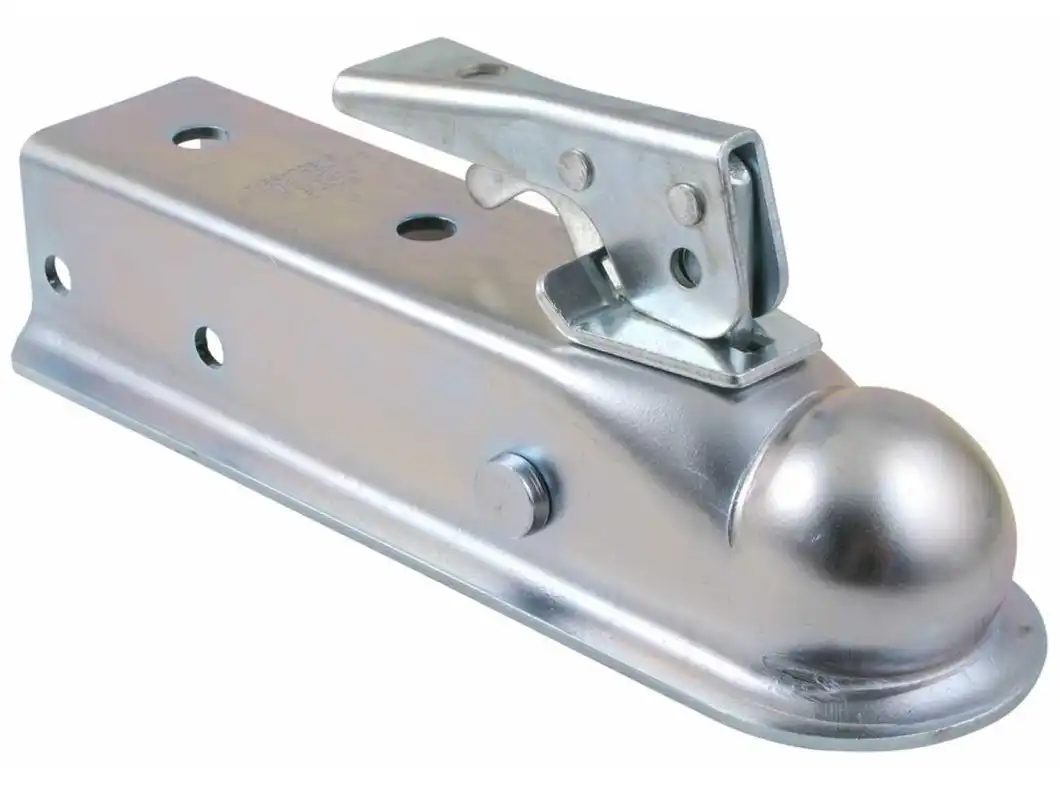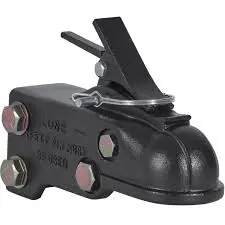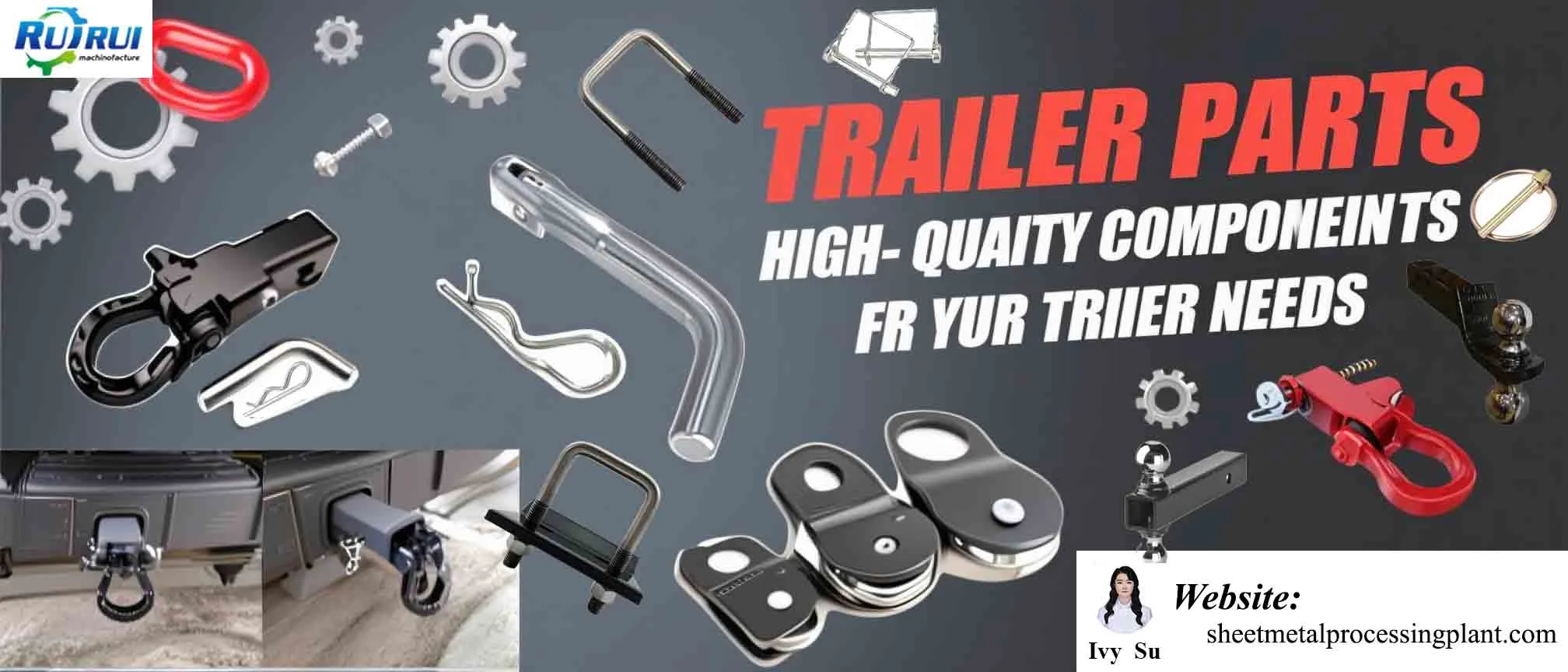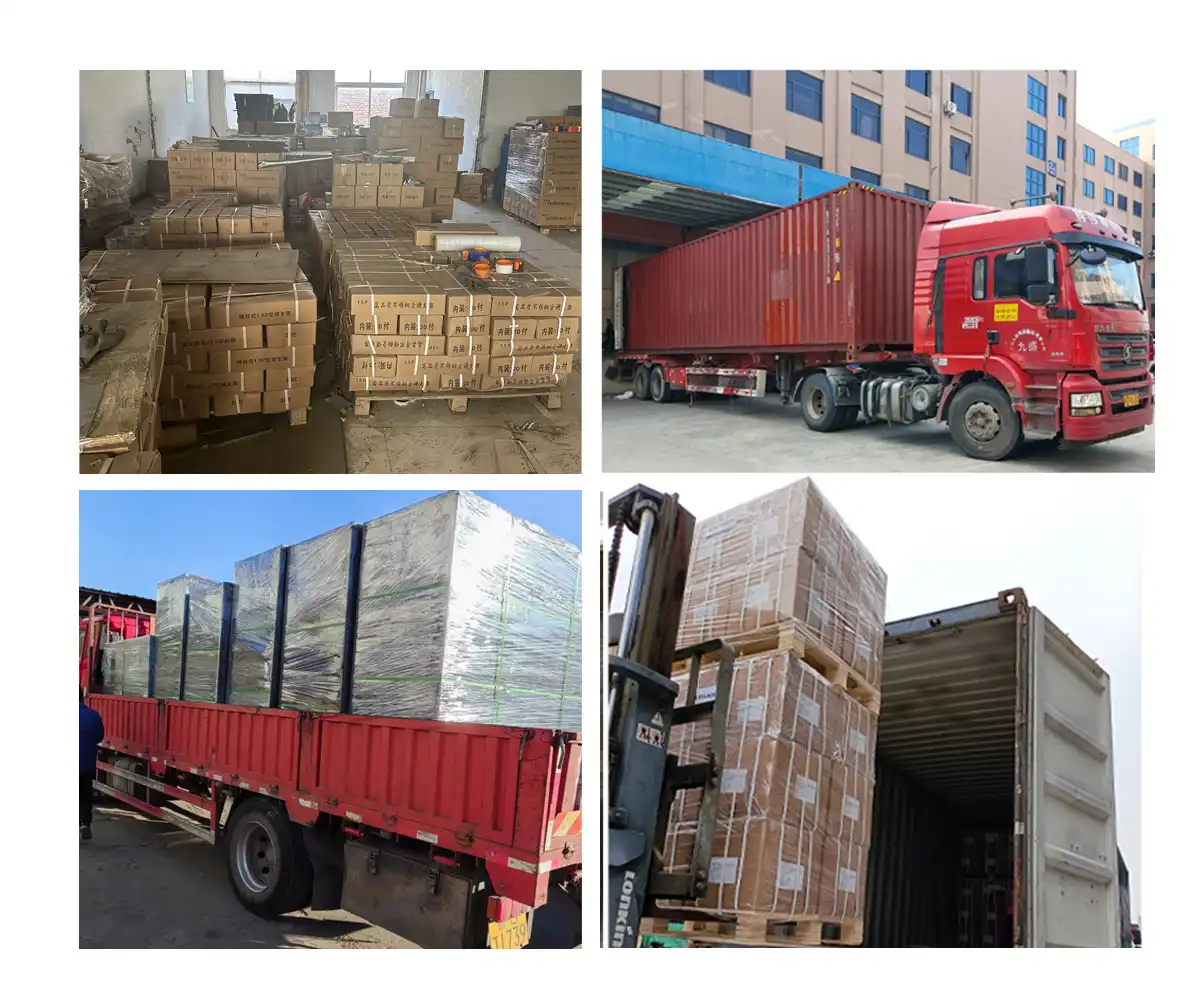Vehicle-Specific Trailer Coupler: The Key to Safer, Smoother Hauling
2025-10-28 14:17:17
Picture this scenario: you're driving down the highway with a loaded trailer when you suddenly feel unsettling sway and instability threatening your control. This frightening situation often stems from using an incompatible or improperly matched trailer coupler. A Vehicle-Specific Trailer Coupler is engineered to match your exact towing setup, eliminating dangerous mismatches that compromise safety. By selecting the right Vehicle-Specific Trailer Coupler for your vehicle and trailer combination, you ensure optimal weight distribution, secure connection, and confident hauling every single time.

Why Vehicle-Specific Trailer Couplers Matter for Towing Safety?
When it comes to trailer safety, the connection between your vehicle and trailer represents the most critical point in your entire towing system. A Vehicle-Specific Trailer Coupler is designed with precise engineering to match your vehicle's hitch system, trailer weight capacity, and tongue configuration. Unlike generic universal couplers that attempt to fit multiple applications, vehicle-specific models account for the unique towing characteristics of your particular setup. The proper Trailer Coupler eliminates excessive play, reduces wear on components, and maintains consistent contact throughout acceleration, braking, and cornering maneuvers.
-
Understanding Load Distribution and Tongue Weight
The relationship between your Vehicle-Specific Trailer Coupler and proper weight distribution directly impacts handling stability and braking performance. Proper tongue weight typically represents ten to fifteen percent of total trailer weight, and the right Trailer Coupler maintains this balance without flexing or distorting under load. When couplers don't match vehicle specifications, they can create dangerous situations where weight shifts unpredictably during travel. Vehicle-Specific Trailer Couplers are manufactured with precise tolerances that ensure consistent performance across varying load conditions, weather situations, and road surfaces throughout extended hauling operations.
-
Material Selection and Manufacturing Standards
High Quality Vehicle-Specific Trailer Couplers are manufactured from engineered steel alloys that undergo specialized heat treatment processes to achieve optimal strength-to-weight ratios. The manufacturing process includes progressive stamping operations that create uniform grain structures resistant to fatigue cracking and stress concentration. Advanced surface treatments such as powder coating, zinc plating, or anodizing protect against corrosion while maintaining dimensional accuracy. Quality manufacturers implement rigorous inspection protocols including non-destructive testing methods to verify structural integrity before couplers reach end users, ensuring reliable performance throughout their service life.

Matching Coupler Types to Vehicle and Trailer Specifications
Different towing applications demand specific Trailer Coupler configurations based on vehicle capabilities, trailer design, and intended use patterns. Standard ball couplers work effectively for light-duty utility trailers and recreational applications where gross vehicle weight remains below five thousand pounds. Adjustable Vehicle-Specific Trailer Couplers provide height flexibility for situations where you tow with multiple vehicles having different hitch heights, maintaining level orientation regardless of the tow vehicle. A-frame couplers distribute forces across wider mounting points, offering enhanced stability for wider trailers or those carrying uneven loads across their deck surfaces.
-
Heavy-Duty Applications and Specialized Designs
For commercial hauling or equipment transport exceeding ten thousand pounds, gooseneck and fifth-wheel Vehicle-Specific Trailer Couplers position the connection point directly above the rear axle of the tow vehicle. This configuration dramatically improves weight distribution and turning radius compared to conventional bumper-mounted systems. Pintle hook and lunette ring combinations provide military-grade durability for extreme off-road conditions and maximum articulation during severe terrain navigation. Surge brake Trailer Couplers incorporate hydraulic mechanisms that automatically activate trailer brakes during deceleration, eliminating the need for electronic brake controllers in certain applications.
-
Installation Requirements and Mounting Considerations
Proper installation of your Vehicle-Specific Trailer Coupler requires precise alignment with the trailer tongue and secure fastening using grade eight or higher bolts torqued to manufacturer specifications. The coupler mounting surface must be clean, flat, and free from rust or damage that could compromise connection strength. Many quality couplers feature through-bolt designs that distribute clamping forces evenly across mounting flanges, preventing stress concentration at individual fastener locations. Regular inspection of mounting hardware should become part of routine maintenance schedules, with particular attention to signs of loosening, corrosion, or metal fatigue around attachment points.
Safety Features and Locking Mechanisms in Modern Couplers
Contemporary Vehicle-Specific Trailer Couplers incorporate multiple redundant safety features that prevent accidental disconnection during operation. The primary latch mechanism securely captures the hitch ball and requires deliberate action to release, while secondary safety latches provide backup retention if the primary latch fails or loosens. Many high-quality Trailer Coupler designs include visual indicators that clearly show when the coupler is properly engaged and locked, eliminating guesswork during hitching procedures. Integrated grease channels facilitate proper lubrication of bearing surfaces, reducing friction and extending component service life significantly.
-
Preventing Theft and Unauthorized Use
Security-conscious operators often specify Vehicle-Specific Trailer Couplers with integrated locking mechanisms that prevent unauthorized trailer removal from storage locations or job sites. These locks typically use hardened steel pins that pass through the coupler mechanism, physically blocking latch operation when engaged. Some advanced systems incorporate keyed-alike features allowing a single key to operate multiple trailer and equipment locks throughout a fleet. The Vehicle-Specific Trailer Coupler for sale from reputable manufacturers often includes anti-drill plates and pick-resistant lock cylinders that resist common theft techniques, providing genuine security rather than simple deterrence.
-
Inspection and Maintenance Best Practices
Establishing a systematic inspection routine for your Trailer Coupler extends its operational life and maintains safety margins throughout years of service. Before each towing operation, visually inspect the coupler for cracks, deformation, excessive wear, or corrosion that could indicate impending failure. The latch mechanism should operate smoothly without binding or excessive free play, and safety chains should be properly attached with adequate but not excessive slack. Apply automotive-grade bearing grease to ball contact surfaces and pivot points according to manufacturer recommendations, typically every five towing cycles or monthly intervals depending on usage intensity and environmental exposure conditions.

Compatibility Across Vehicle Classes and Trailer Types
Selecting the appropriate Vehicle-Specific Trailer Coupler requires careful consideration of both your tow vehicle's capabilities and the trailer's design characteristics. Light-duty passenger vehicles with Class I or Class II hitches typically match with couplers rated between two thousand and three thousand five hundred pounds gross trailer weight. Mid-size trucks and SUVs equipped with Class III hitches can safely utilize Trailer Coupler assemblies rated up to eight thousand pounds when properly configured. Full-size trucks with Class IV or Class V receiver hitches accommodate couplers designed for ten thousand pounds and above, enabling safe transport of equipment trailers, livestock haulers, and recreational vehicles.
-
Adjustability and Multi-Vehicle Applications
For operators who tow with multiple vehicles having varying hitch heights, adjustable Vehicle-Specific Trailer Couplers provide essential flexibility without compromising safety or performance. These units feature precision adjustment mechanisms that allow raising or lowering the coupler in relation to the trailer tongue, maintaining level attitude across different towing combinations. Quality adjustable designs incorporate secure locking systems that prevent unintended movement after adjustment, maintaining consistent geometry throughout operation. The Vehicle-Specific Trailer Coupler price point for adjustable models represents worthwhile investment when considering the versatility they provide across diverse towing scenarios and vehicle configurations.
-
Environmental Considerations and Corrosion Resistance
Operating environments significantly impact Trailer Coupler longevity and performance reliability. Coastal regions with salt air exposure, northern climates using road deicing chemicals, and agricultural applications involving fertilizer and chemical exposure all accelerate corrosion processes. High Quality Vehicle-Specific Trailer Couplers combat these challenges through advanced surface treatments including hot-dip galvanizing, electroplating, or ceramic-reinforced powder coating systems. Stainless steel construction represents the premium solution for maximum corrosion resistance, though this material selection increases the Vehicle-Specific Trailer Coupler price substantially compared to treated carbon steel alternatives.
Manufacturing Excellence and Quality Assurance Protocols
Leading China Vehicle-Specific Trailer Coupler manufacturers implement comprehensive quality management systems that control every aspect of the production process from raw material verification through final inspection and packaging. Progressive stamping operations utilize precision dies maintained to tolerances measured in thousandths of an inch, ensuring dimensional consistency across production runs numbering in the hundreds of thousands of units annually. Automated robot welding cells produce uniform, high-strength joints free from the variability inherent in manual welding processes, while computer-controlled heat treatment furnaces deliver consistent metallurgical properties throughout each production batch.
-
Testing and Certification Requirements
Reputable China Vehicle-Specific Trailer Coupler suppliers subject their products to rigorous testing protocols that verify performance under both static and dynamic loading conditions. Load testing procedures apply forces substantially exceeding rated capacity to demonstrate adequate safety margins, while cyclic fatigue testing simulates years of operational stress in compressed timeframes. Dimensional inspection using coordinate measuring machines confirms that finished products conform precisely to engineering specifications. Third-party certification bodies validate compliance with international safety standards including SAE J684 for trailer couplers and various ISO specifications governing mechanical fastening systems, providing objective verification of product quality and reliability.
-
Material Traceability and Process Control
Quality-focused China Vehicle-Specific Trailer Coupler manufacturers maintain complete material traceability from steel mill certifications through finished product identification markings. This documentation enables rapid identification and resolution of any quality issues that might arise during field service. Statistical process control methodologies continuously monitor critical manufacturing parameters, automatically alerting production personnel to deviations before they result in nonconforming products. Regular calibration of measurement and testing equipment ensures accuracy of quality verification procedures, while comprehensive record-keeping facilitates continuous improvement initiatives and customer-specific customization requirements for specialized applications.
Cost Considerations and Value Analysis
When evaluating Vehicle-Specific Trailer Coupler price options, discerning buyers recognize that initial purchase cost represents only a fraction of total ownership expenses over a coupler's service life. Premium couplers manufactured from superior materials with advanced corrosion protection may command higher initial investment but deliver substantially lower lifecycle costs through extended service intervals and reduced maintenance requirements. The China Vehicle-Specific Trailer Coupler wholesale market offers competitive pricing for fleet operators and OEM customers requiring large quantities, though individual purchasers should prioritize quality and proper application matching over simple cost minimization when safety-critical towing components are concerned.
-
Return on Investment Through Reliability
Operational downtime resulting from coupler failure during critical hauling operations imposes costs far exceeding the price differential between economy and premium coupler options. A failed Trailer Coupler can result in damaged cargo, vehicle damage, accident liability, missed delivery deadlines, and potential injury to operators or bystanders. Quality China Vehicle-Specific Trailer Coupler factory products from established manufacturers with proven track records provide peace of mind and operational reliability that directly impact profitability. Professional operators increasingly recognize that specifying appropriate components from the outset avoids expensive retrofitting, premature replacement, and the hidden costs associated with unreliable equipment throughout ownership periods.
-
Customization Options and Specialized Requirements
Standard Vehicle-Specific Trailer Coupler configurations satisfy the majority of conventional towing applications, but specialized circumstances sometimes demand custom engineering solutions. Modified mounting dimensions, non-standard capacity ratings, integrated auxiliary features, or unique environmental protection requirements may necessitate custom manufacturing. Established China Vehicle-Specific Trailer Coupler manufacturers with comprehensive fabrication capabilities can develop tailored solutions that precisely address specific application challenges. This customization capability proves particularly valuable for OEM trailer manufacturers, specialty equipment builders, and operators with unique regulatory compliance requirements that standard products cannot accommodate through minor modifications alone.

Conclusion
Vehicle-Specific Trailer Couplers represent the critical safety link between towing vehicles and trailers, directly impacting operational security, handling stability, and component longevity. Proper selection demands careful consideration of load ratings, compatibility factors, environmental conditions, and quality standards that ensure reliable performance throughout demanding service conditions.
Cooperate with Qingdao RUIRUI Machinary Co., LTD.
As a leading China Vehicle-Specific Trailer Coupler manufacturer, Qingdao RUIRUI Machinery Co., LTD combines advanced manufacturing capabilities with rigorous quality control to deliver superior trailer coupling solutions. Our facility, equipped with eight automated production lines and robotic fabrication systems, produces 130,000 precision-engineered components annually. We specialize in progressive stamping, deep drawing, CNC machining, and laser cutting operations that create High Quality Vehicle-Specific Trailer Couplers meeting international standards. Our comprehensive surface treatment capabilities including powder coating, plating, anodizing, and electrophoresis ensure maximum corrosion resistance across diverse operating environments.
As an established China Vehicle-Specific Trailer Coupler supplier, we serve clients across more than eighty countries with ISO 9001, ISO 14001, and OHSAS 18001 certified management systems guaranteeing consistent quality. Our experienced engineering team provides OEM support and custom design services tailored to specific application requirements. Whether you need standard Vehicle-Specific Trailer Coupler for sale configurations or specialized solutions, RUIRUI delivers competitive pricing without compromising quality standards. Our technical support team assists with product selection, installation guidance, and ongoing service throughout the product lifecycle.
Contact us today at info@qdkshd.com to discuss your trailer coupler requirements. As a trusted China Vehicle-Specific Trailer Coupler factory and China Vehicle-Specific Trailer Coupler wholesale provider, we offer bulk order capabilities, flexible customization options, and responsive customer service. Bookmark this resource for future reference when trailer coupling challenges arise, and discover why discerning professionals worldwide choose RUIRUI for critical towing components that deliver safety, reliability, and value.
References
1. Society of Automotive Engineers. "SAE J684: Trailer Couplings and Hitches - Automotive Type." SAE International Standards Committee, 2019.
2. Thompson, Robert J. and Mitchell, Catherine L. "Mechanical Design Analysis of Heavy-Duty Trailer Coupling Systems." Journal of Mechanical Engineering and Transportation, Vol. 47, 2021.
3. National Highway Traffic Safety Administration. "Federal Motor Vehicle Safety Standards: Trailer Coupling Devices." U.S. Department of Transportation, 2020.
4. Anderson, David P. "Materials Engineering for Trailer Coupling Components: Strength, Durability and Corrosion Resistance." International Journal of Automotive Engineering, Vol. 34, 2022.
Send Inquiry
You may like
